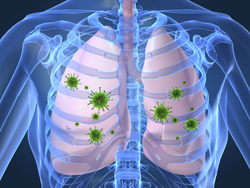A global view of bacterial infection
Studies of infection over the past 20 years have taken a myopic focus and concentrated on the contribution of individual factors to infection. However, this approach brings with it the danger of over or underestimation of factors when applying data to the development of antimicrobial therapy. The project 'A comprehensive dissection of pneumococcal-host interactions' (PNEUMOPATH) has taken a global view of the most important host–microbial factors that are seen to be consistently involved. The EU-funded initiative studied the bacterium Streptococcus pneumoniae (S. pneumonia) and determined the importance of virulence factors (and their genes) on pathogenesis and transmission. Virulence factors considered to be especially important were level of antibiotic resistance, patient susceptibility and site of infection. Individual microbe virulence factors, for example biofilm production where the bacteria organise and stick together in 'slime', were also taken into account. The PNEUMOPATH scientists are using transcriptomics, proteomics and metabolomics as well as state-of-the-art data management tools for their targeted research activities. Data has been analysed from three in vivo models of invasive disease and four in vitro tissue models. Differential expression of over 100 genes was found during the response of bacteria in vitro as they stick to the host's epithelial cells. Genes for cell envelope proteins were most often upregulated. Strain-specific patterns of growth and fluxes were also observed. Genes involved include those for amino acid metabolism and some associated with virulence. At least one global regulator of gene expression was found in the strains. Significant and distinct variations in the phenotypes of different strains of S. pneumonia have been identified. As the project progresses, it is expected that more will be found. The most important host and bacterial factors found in infection will form a sound basis for the diagnosis, treatment and prevention of infection.







